Civic Platform is a liberal-conservative and conservative-liberal political party in Poland. Civic Platform came to power following the 2007 general election as the major coalition partner in Poland's government, with party leader Donald Tusk as Prime Minister of Poland. Tusk was re-elected as Prime Minister in the 2011 general election but stepped down three years later to assume the post of President of the European Council. Prime Minister Ewa Kopacz led the party in the 2015 general election but was defeated by the Law and Justice party. On 16 November 2015 Civic Platform government stepped down after exactly 8 years in power. In 2010 Civic Platform candidate Bronisław Komorowski was elected as President of Poland, but failed in running for re-election in 2015. PO is the second largest party in the Sejm, with 138 seats, and the Senate, with 33 seats. Civic Platform is a member of the European People's Party (EPP).

Law and Justice is a national-conservative, Christian democratic political party in Poland. With 237 seats in the Sejm and 66 in the Senate, it is currently the largest party in the Polish parliament.

Roman Jacek Giertych is a Polish politician and lawyer; he was Deputy Prime Minister and Minister of Education until August 2007. He was a member of the Sejm from 2001 until October 2007 and the chairman of the League of Polish Families party.
Poland does not legally recognize same-sex unions, either in the form of marriage or civil unions. In 2012, the Supreme Court ruled that same-sex couples have limited legal rights in regards to the tenancy of a shared household. A few laws also guarantee certain limited rights for unmarried couples, including couples of the same sex. Same-sex spouses also have access to residency rights under EU law.
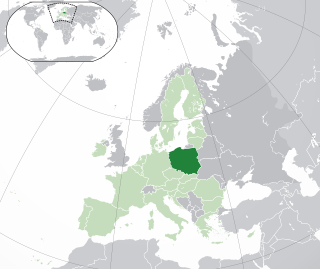
Lesbian, gay, bisexual, and transgender (LGBT) people in Poland face legal challenges not faced by non-LGBT residents. Both male and female same-sex sexual activity are legal in Poland. This was formally codified in 1932, and Poland introduced an equal age of consent for homosexuals and heterosexuals, which was set at 15. Poland provides LGBT people with the same rights as heterosexuals in certain areas: gay and bisexual men are allowed to donate blood, gays and bisexuals are allowed to serve openly in the Polish Armed Forces, and transgender people are allowed to change their legal gender following certain requirements including undergoing hormone replacement therapy. Polish law bans employment discrimination based on sexual orientation. No protections for education, health services, hate crimes and hate speech exist, however. In 2018, the Supreme Court ruled that it is illegal to deny goods and services on the basis of sexual orientation.
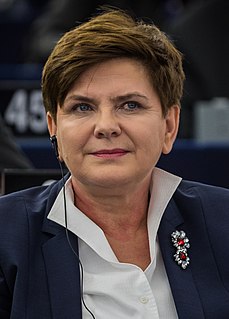
Beata Maria Szydło is a Polish politician who is serving as Deputy Prime Minister of Poland and vice-chairman of the Law and Justice party.
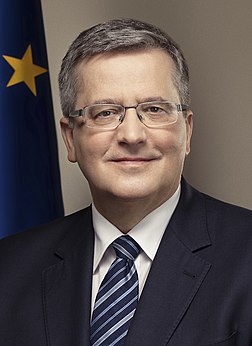
The popular election of the President of Poland was held on 20 June 2010. As no candidate received a majority of votes in the first round, a second round was held on 4 July 2010. Bronisław Komorowski, candidate of Civic Platform, defeated Jarosław Kaczyński, candidate of Law and Justice. The global financial crisis, flooding in Poland and the Smolensk disaster were the main themes in the last months of the election campaign.

Łzy is a Polish pop/rock band.
Libertas Poland is a political party in Poland. It contended the 2009 European Parliament elections under a common banner with Libertas Party Limited, the organization founded by Declan Ganley.

Poland Comes First, also rendered as Poland is the Most Important, and abbreviated to PJN, was a centre-right, conservative liberal, political party in Poland. It was formed as a more moderate breakaway group from Law and Justice (PiS). By early 2011, the party had eighteen members of the Sejm, one member of the Senate, and three members of the European Parliament. Poland Comes First ceased to exist as a political party in December 2013, when it joined the new centre-right party led by Jarosław Gowin named Poland Together.
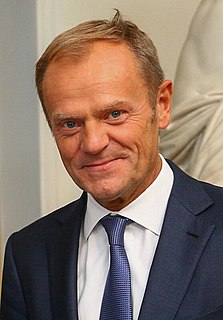
A parliamentary election to both the Senate and the Sejm was held in Poland on 9 October 2011. The previous election, in 2007, resulted in a Civic Platform–Polish People's Party government. All seats of both Houses were up for re-election.
Tomasz Makowiecki is a Polish musician, singer and songwriter.
Case C-639/11 is case judged by the European Court of Justice. It is often referred to as the Grzegorz Dorobek case after the first of 16 complainants whose grievances were accepted by the European Commission as grounds for the commission to bring the case against the Republic of Poland. It specifically deals with whether vehicles with a steering wheel on the right hand side must be given a registration number by the authorities in Poland. More generally it deals with the citizens' rights of free movement, which form the basis of the European Project. It also deals with the right of the European Commission to give instructions to member countries and the strength of grounds needed for member states to ignore the general rights and specific instructions.

Razem is a left-wing political party in Poland formed in May 2015. It was one of the eight nationwide committees standing in the 2015 parliamentary election.

The Polish Constitutional Court crisis of 2015 is a political conflict which began in Poland in October 2015 with the appointment of five Constitutional Tribunal judges by the Civic Platform party. As of 20 December 2017, the crisis had, according to the European Commission, extended to include "13 laws affecting the entire structure of the justice system in Poland". The Constitutional Tribunal changes included the replacement of three judges whose terms were not due to expire until after the first possible date of meeting of the new parliament and two judges whose terms were not due to expire until after the last possible date of meeting of the new parliament. According to Polish law, judges of the Constitutional Tribunal are to be elected by the parliament which is sitting when the terms of the previous judges expire. Civic Platform was predicted to lose the upcoming elections. After the Law and Justice party won the parliamentary election, it made its own appointments to the court, arguing that the previous appointments of the five judges by PO were unconstitutional. In December, PiS changed the court's decision-making power by prescribing a two-thirds majority vote and mandatory participation of at least 13 of the 15 judges on the Constitutional Tribunal. The appointments and amendments caused domestic protests and counter-protests in late December and early January; one of the most significant outcomes was the creation of the Committee for the Defence of Democracy protest movement. The law changes were criticized by European Commission as threatening the rule of law and the human rights of Polish citizens.
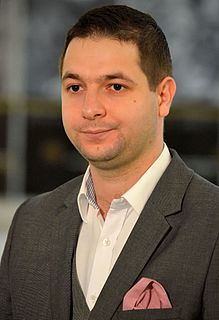
Patryk Tomasz Jaki is Deputy to the Seventh and Eighth Term Sejm; Opole Councillor during the Fifth and Sixth Term; Secretary of State in the Ministry of Justice, First Deputy Minister of Justice and First Deputy Attorney General since 2015; Chairman of the Verification Committee for Reprivatisation since 2017.

Possession of most drugs for recreational use, including cannabis, is illegal in Poland. It was classified as a narcotic in 1951 but it was not until 1999 that possession and use of the drug became a crime. Since 2011, prosecutors have the discretion to drop the charges if the quantity of drugs seized is only a small amount. The medical use of cannabis was legalized in 2017.

The Citizens of Poland is an informal civic movement in Poland engaged in pro-democracy actions and anti-fascist movement, opposed to the actions of the government led by the Law and Justice (PiS) party. Citizens of Poland practice non-violent civil disobedience.

















